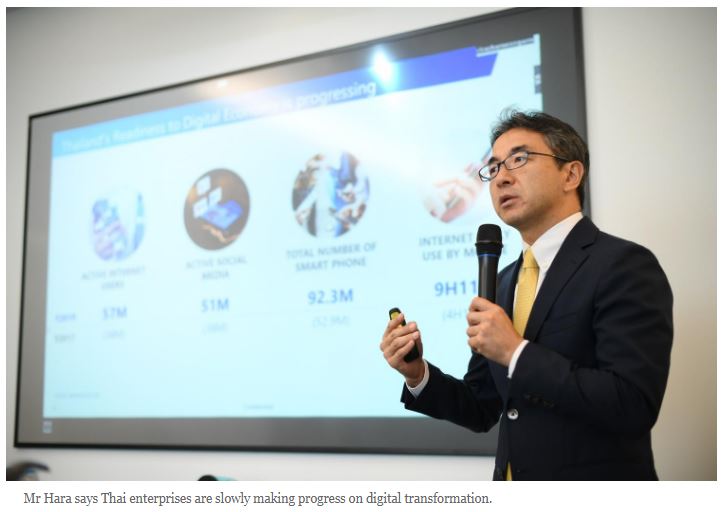Thailand: Most ventures stuck in digital transition
Of the three stages in digital transformation, 70% of Thai enterprises are in the second step, using software applications and cloud computing, integrating silos of data and making predictions via data analysis, says ABeam Consulting (Thailand), a subsidiary of the Japanese firm.
The first step is known as digitisation, where organisations’ data is stored in computers.
The second stage is digitalisation, where all data are integrated into one network, which enables organisations to start connecting with other business partners with digital tech.
The final step is digital transformation, where connected enterprises can create new value for digital transformation.
Ichiro Hara, managing director of ABeam Consulting (Thailand), said Thai enterprises are making progress on digital transformation maturity but still struggle to reach further stages of the evolution.
The survey was collected from global research as well as information from ABeam’s 180 clients in Thailand.
Mr Hara said most Thai enterprises are still in the second stage of digital execution.
“Some 70% of Thai enterprises have not yet reached the third stage, where connected enterprises create new value in digital transformation,” he said.
“Digital transformation in any organisation requires not only technology but also strategic management, leadership, work processes and human resources management, which have to be integrated in the same direction.”
ABeam also looks into how enterprises plan for digital transformation.
Most of them were found to be only in the first stage, with no strategy for digital transformation, he said.
The second step entails individual digitalisation ideas for specific divisions or areas, while the third stage involves a digital strategy for the whole organisation.
Mr Hara said digital transformation requires six key factors for success:
leadership must set out a clear direction, while organisations need a culture and awareness that gravitates towards digital transformation;
the right strategy for IT and business operations;
process and analysis reformation for the best digital technology;
innovation while IT implementation must be based on digital transformation strategy;
organisational reforms to draw in new ideas from all collaborating teams;
and human resource management must provide new knowledge about digital transformation to staff.
Mr Hara said despite the sagging economy, many enterprises are moving towards digital transformation to help their operations cope with rapidly changing business systems.
Thailand is one of the strongest countries for digital adoption in Asia-Pacific, he said.
The country has 57 million active internet users and 51 million social media users.
Some 92.3 million smartphones are being used.
Thais spend an average of nine hours and 11 minutes per day on the internet via their mobile devices.
Mr Hara said the company targets total revenue of 906 million baht this year, an increase of 30% from 702 million in 2018.
Source: https://www.bangkokpost.com/business/1729911/most-ventures-stuck-in-digital-transition


 English
English




